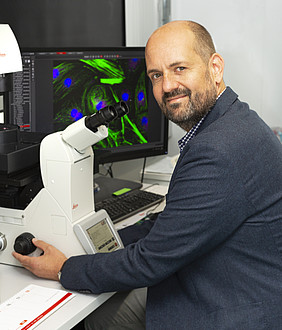In chronic heart failure, the heart can no longer supply the body with sufficient blood and thus oxygen. If musclin is missing in the skeletal muscle, heart failure worsens. Typically, the messenger substance protects the heart and even improves cardiac insufficiency if more of it is present. Scientists were able to observe this in a mouse model. They administered musclin to the skeletal muscle of mice with weak hearts using gene therapy, which alleviated the heart failure. Like patients with heart failure, the mice had less musclin in the muscle and circulating blood. In genetically modified mice that lacked musclin in skeletal muscle, heart failure worsened.
Scientists from the European Center for Angioscience (ECAS) at the Mannheim Medical Faculty of the University of Heidelberg, led by Professor Jörg Heineke, have joined forces with researchers from Hannover Medical School (MHH) to track down the messenger substance. Jörg Heineke is Principal Investigator at the DZHK.
Musclin, which is formed in skeletal muscle - but not in cardiac muscle - enters the heart via the bloodstream and protects it in two ways: It strengthens the power of the heart muscle cell and prevents the deposition of connective tissue – therefore counteracting fibrosis.
Since much of the messenger substance musclin is produced during sport, the researchers assume that athletically trained muscle can contribute to heart health. The results open up a possible strategy for the therapy of chronic heart failure: "We observe a decreased expression of musclin in the skeletal muscles of patients with heart failure. Therefore, it is quite conceivable that overexpression of this protein in muscle could counteract the disease," concludes Professor Heineke confidently.
Chronic heart failure is one of Germany's most common causes of death. Particularly at risk are the approximately 20 per cent of patients who show significant muscle tissue loss in the course of the disease. Compared to patients without muscle atrophy, these have a significantly higher risk of dying from heart failure.
Publication: Szaroszyk, M., Kattih, B., Martin-Garrido, A. et al. Skeletal muscle derived Musclin protects the heart during pathological overload. Nature communications, 13, 149 (2022)
DOI: https://doi.org/10.1038/s41467-021-27634-5
Source: Press Release Universitätsmedizin Mannheim


